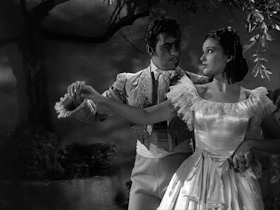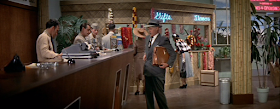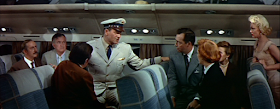I love Zorro. I've loved him since I was a tiny person -- he was one of my first heroes. In fact, I think only Robin Hood and the Lone Ranger have been heroes of mine longer, and Zorro is sort of an amalgamation of the two of them, isn't he? Championing the poor and oppressed, wearing a mask to strike fear into the heart of any evildoer who crosses him, and so on.
The first time I encountered Zorro, it was in a picture book based on the Disney
Zorro series from the 1950s that starred Guy Williams. Then I watched a few episodes of the early-nineties TV series that starred Duncan Regehr before finally getting to see a handful of the Guy Williams episodes on VHS.
But in my late teens, I got to see
The Mark of Zorro (1940) for the first time on VHS as well. Or maybe on PBS? I remember there being a documentary with it too that talked about how Basil Rathbone was a wonderful swordsman for real, and that Tyrone Power had to learn a lot to keep up with him. That the little trick Zorro does toward the end of this movie, where he slices through a burning candle and it stays upright and burning -- Basil Rathbone could do that for real. They had to fake it for Power in the film by drawing in the end of his sword across the candle in post-production.
Anyway, this movie is a rollicking good time. It opens in Spain, with handsome cadet Diego Vega bidding farewell to his friends because his family has called him home to California.
He's not pleased with having to go home to boring California where there's nothing to do but get married to some provincial girl, raise fat children, and tend vineyards. He's used to dueling, riding fast horses, and pursuing beautiful women around the academy.
He's in for a surprise when he gets home, however. His father is no longer the
alcalde of Los Angeles. And the new
alcalde has a sly and smug henchman, Captain Pasquale (Basil Rathbone), who enjoys threatening strangers with his sword. On the spot, with no apparent premeditation, Diego affects the demeanor of a harmless dandy, dabbing at his forehead and lips with a scented hankie and acting distressed by the sight of a sword.
The new
alcalde, Don Luis Quintero (J. Edward. Bromberg), is a pompous fool. Anyone can see Pasquale is the real power here. But Diego pretends not to.
Anyone can also see that Pasquale has the hots for Quintero's wife Inez (Gale Sondergaard). Inez promptly sets her sights on Diego -- she seems to have grown tired of Pasquale and is eager for a handsome new plaything.
Diego plays along with Inez, flattering her and bolstering her vanity. But he's spotted Quintero's niece Lolita (Linda Darnell) and his thoughts and eyes belong to her now.
Diego finally returns to his family's
hacienda, reuniting with his father (Montagu Love), mother (Janet Beecher), and his old mentor Fray Felipe (Eugene Pallette). He continues pretending to abhor violence and long only for peace and quiet.
The people of Los Angeles are suffering under the rule of Quintero/Pasquale, who tax them close to death and are generally crabby and grabby. One day, two soldiers put up a notice about more taxes to be collected when a stranger rides into the square.
He wears all black, including a black mask, waves a sword around a lot, and rides a black horse. And he pulls down the taxation notice with the tip of his sword and makes the soldiers put up his own announcement instead.
Next, Zorro visits Quintero at night, appearing in his office seemingly by magic. He frightens Quintero and tells him he won't rest until Quintero goes back to Spain.
They do some really nice things with shadows in this movie. Here, Zorro's shadow looms over Quintero.
Here, he towers above soldiers that he's about to rob of the unfair taxes they've collected.
While Zorro dashes around the countryside robbing the rich and looking all debonair and exciting, Diego pretends to be bored pursuing the hand of Lolita Quintero in marriage. We all know he actually likes her a whole lot, but he keeps up the facade of a popinjay. Still, when they dance after dinner at her father's house, Lolita can't help feeling there's more to Diego than meets the eye.
Eventually, Pasquale begins to figure that out too. He and Diego have a magnificent sword fight, though (SPOILER) he dies before confirming his suspicion that Diego and Zorro are one and the same. (END SPOILER)
This is a really splendid duel, by the way -- because Rathbone was a fencing champion, he did all of his own fencing! Power did a lot too, but did have a double for some of the trickier bits.
Everything ends happily, of course, with peace restored to the land. Zorro can hang up his mask and sword, and Diego can wed the beautiful Lolita, settle down, and raise fat children and tend a vineyard.
This is not a deep film, but it's a highly enjoyable one. If you'd like to see a different adaptation that uses the exact same script, but with a different cast, try to find
the 1974 version, which is also lots of fun!
This has been my contribution to the
Suave Swordsman: Basil Rathbone Blogathon hosted by Pale Writer. Follow that link to find the other posts people have contributed to this event!
Is this movie family friendly? Yes! All innuendo about Inez's extramarital activities is veiled and oblique, and all violence is non-graphic. There are a couple of kisses, but that's it. I hadn't watched this movie for a few years, so I showed it to my kids for their first time this week, and they got a huge kick out of it!















































